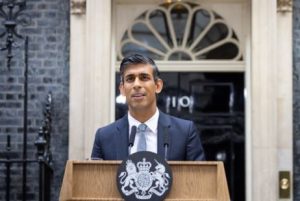UK’s Rwanda solution facing challenges
It’s an awkwardly symbolic scenario when more than 50 years after the brutal despot Idi Amin expelled South Asians from Uganda, a British Prime Minister of Indian heritage is arresting and deporting asylum seekers to Africa.
The historical comparison speaks to the bizarre and almost grotesque nature of Britain’s Rwanda policy – which will see thousands of asylum seekers sent to the African nation to have their claims for protection processed.
And just a few weeks after the policy was grudgingly ratified by the UK Parliament, it already seems headed for a train wreck.
Reports from the UK say that operations to detain asylum seekers across the UK will begin shortly, weeks earlier than expected, in preparation for their removal to Rwanda.
Advocates and lawyers say the move to detain people will almost certainly provoke protracted legal battles, community protests and clashes with police.
Police in some parts of the country have been put on high alert.
In Scotland, local communities in Scotland have twice prevented deportations by staging mass protests, in 2021 and 2022. On both occasions, hundreds of people surrounded immigration enforcement vehicles to prevent asylum seekers being removed.
Meanwhile, reports say public servants are leaving jobs linked to the Rwanda scheme with many former Home Office staff saying the scheme is unworkable.
The reports cite high rates of staff departures in the Home Office’s asylum division as well as a rise in applications to transfer into different jobs.
Earlier reports revealed that Home Office staff had been asked to apply for jobs in Rwanda to help process the asylum claims of migrants sent there from the UK. People whose claims are found to be legitimate will have to stay in Rwanda.
The FDA union, which represents senior civil servants, is considering launching a judicial review against the law, and the Public and Commercial Services Union (PCS) is reported to be considering balloting for strike action if operational staff are ordered to violate a European Court of Human Rights ruling.
At the same time, the Irish Government has said the Rwanda scheme has meant more asylum seekers, who fear ending up in Rwanda, are making their way from the UK to Ireland putting strain in resources.
 Ireland’s Foreign Minister Michael Martin said migrants were crossing from Northern Ireland into the Republic to seek safety from deportation to Rwanda.
Ireland’s Foreign Minister Michael Martin said migrants were crossing from Northern Ireland into the Republic to seek safety from deportation to Rwanda.
Furthermore, huge backlogs and uncertainty about how to apply the new migration laws mean that none of the 73,000 asylum claims lodged since early March, 2023, have been processed, with the queue growing.
About 40,000 of those are small boat migrants that come under the scope of the Government’s new ’duty to remove’, but remain in limbo because the Rwanda scheme has not been activated and there are no deals in place with other countries that could apply to the majority of other cases.
Rwanda was the site of a 1994 genocide. The government on Paul Kagame has been accused of human rights violations, including ex-judicial killings and disappearances.
The US State Department’s Bureau of Democracy, Human Rights and Labor reported that: “significant human rights issues included credible reports of: unlawful or arbitrary killings; torture or cruel, inhuman, or degrading treatment or punishment by the government; harsh and life-threatening prison conditions; arbitrary detention; political prisoners or detainees; transnational repression against individuals located outside the country, including killings, kidnappings, and violence; arbitrary or unlawful interference with privacy”.
The report also accused Rwanda of “serious restrictions on free expression and media, including threats of violence against journalists, unjustified arrests or prosecutions of journalists, and censorship; serious restrictions on internet freedom; substantial interference with the freedom of peaceful assembly and freedom of association, including overly restrictive laws on the organization, funding, or operation of nongovernmental and civil society organisations; serious and unreasonable restrictions on political participation; and serious government restrictions on or harassment of domestic and international human rights organisations.”
The Chief Executive of the UK’s Refugee Council Enver Solomon has slammed to the Rwanda plan as “reckless”.
“The government is determined to recklessly pursue its inhumane Rwanda plan despite the cost, chaos and human misery it will unleash. We know it is likely to cause a catastrophic system meltdown,” he said.












